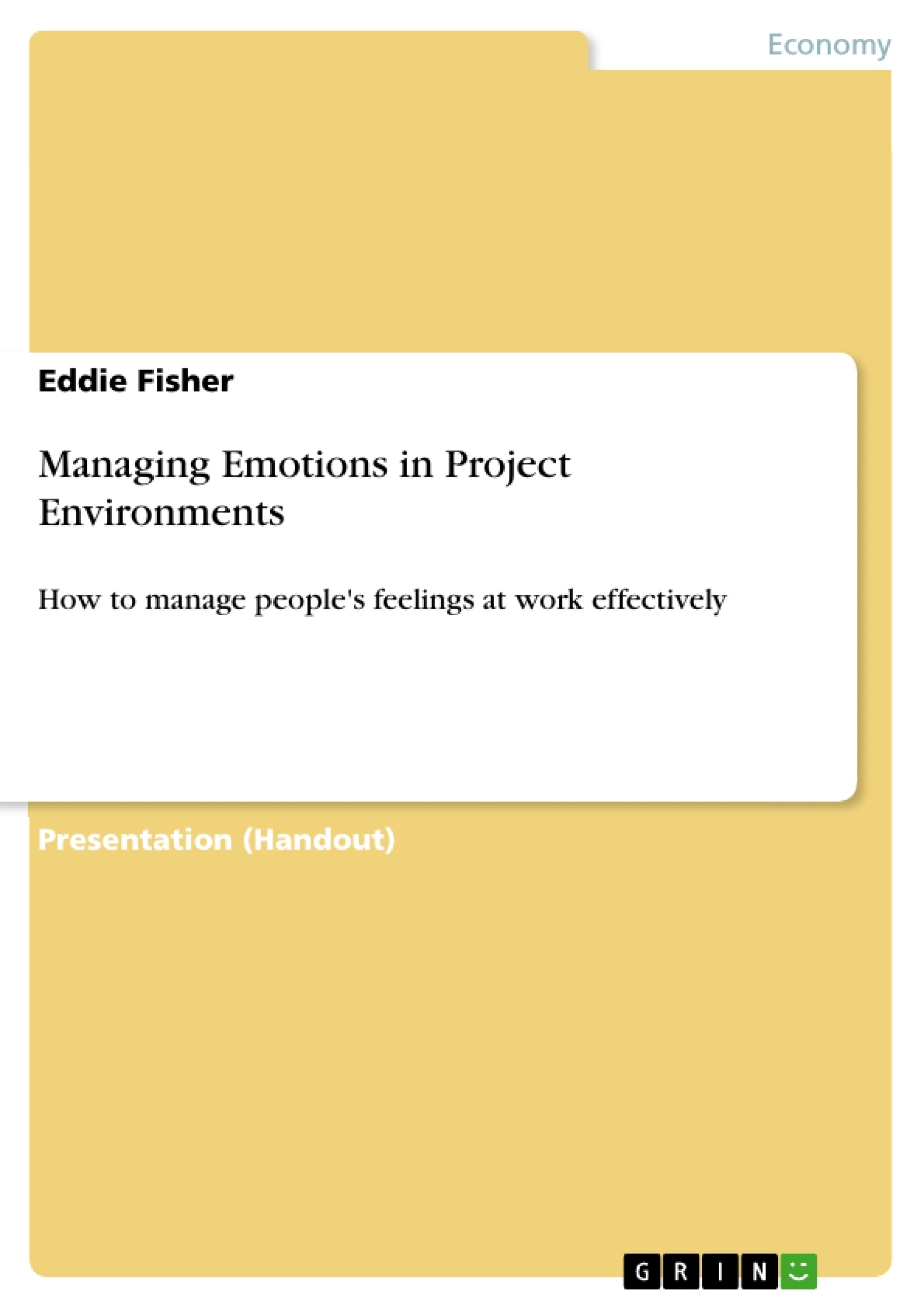The management of feelings in projects is important. Project managers who recognise this and act accordingly, are more likely to deliver their projects successfully. Managing emotions in projects is of particular importance due to the nature of projects. They are temporary organisations that often consist of a mixture of people from both inside and outside of the organisation. Project managers often do not exercise direct line management responsibility over these so they need to manage the emotions of people over which they have no control.
This variety of human beings such as contractors, vendors and so on, needs emotionally-aware project managers who are 'strong in interpersonal skills, knowing how to create an environment where people feel valued and motivated to contribute to their maximum potential, and where problems are considered challenges and errors are considered learning experiences (Verma, 1996). It is, therefore, essential that project managers in the Project-oriented society become competent in managing the feelings of people well within their projects.
Inhaltsverzeichnis (Table of Contents)
- Introduction
- Emotions in Projects
- Meeting Each Other's Needs
- Relating To Each Other Over Time
- Exchanging Information Regarding Feelings, Thoughts and Ideas
Zielsetzung und Themenschwerpunkte (Objectives and Key Themes)
This paper aims to explore the importance of managing emotions in project management, emphasizing the significance of emotional intelligence in achieving project success. The paper draws upon real-life project experiences and insights from recognized experts in the field.
- The importance of recognizing and understanding the emotional needs of project team members
- Developing personal relationships with team members based on mutual trust and respect
- The role of emotional engagement in facilitating effective communication and collaboration
- The impact of emotional intelligence on project outcomes
- Developing interpersonal expertise as a crucial element of successful project management
Zusammenfassung der Kapitel (Chapter Summaries)
Introduction
The introduction emphasizes the importance of managing emotions in projects, highlighting the unique challenges posed by temporary project teams with diverse backgrounds. It introduces the concepts of emotional intelligence and its significance in creating a positive and productive project environment.
Emotions in Projects
Meeting Each Other's Needs
This section discusses the importance of identifying and meeting the needs of project team members. It emphasizes the role of communication, empathy, and understanding in building trust and collaboration. The author shares a personal experience demonstrating the consequences of failing to understand and meet the needs of a team member.
Relating To Each Other Over Time
The focus here shifts to developing long-lasting relationships with project team members. It explores how sharing feelings and building rapport can foster a sense of belonging and mutual respect within the team. The author draws upon an experience from a global project to illustrate the benefits of building strong relationships through open and authentic communication.
Exchanging Information Regarding Feelings, Thoughts and Ideas
This section delves into the importance of emotional engagement in facilitating effective communication and collaboration. It outlines three key behaviors that contribute to positive outcomes in project teams: (1) being aware of one's own emotional state and its impact on communication; (2) assessing the emotional state of team members before engaging in discussions; and (3) transforming negative emotions into positive ones through open communication and empathy.
Schlüsselwörter (Keywords)
This paper explores key themes related to emotional intelligence, project management, team dynamics, interpersonal skills, communication, collaboration, empathy, trust, and relationship building. These concepts are essential for understanding the role of emotions in achieving project success.
Frequently Asked Questions
Why is managing emotions important in projects?
Projects are temporary organizations with diverse teams. Project managers who understand emotional needs can create a more motivated and productive environment.
How can a project manager lead people without direct authority?
By developing strong interpersonal skills and emotional intelligence, managers can build trust and influence team members even without formal line management responsibility.
What role does communication play in managing feelings?
Effective communication involves exchanging not just thoughts and ideas, but also feelings. This helps in resolving conflicts and building mutual respect.
What are the benefits of building long-term relationships in teams?
Strong relationships based on trust lead to better collaboration, a sense of belonging, and a more resilient team during challenging project phases.
How can negative emotions be transformed into positive ones?
By being aware of emotional states and using empathy and open communication, project managers can address concerns and turn errors into learning experiences.
- Quote paper
- Prof Dr Eddie Fisher (Author), 2012, Managing Emotions in Project Environments, Munich, GRIN Verlag, https://www.grin.com/document/196329



